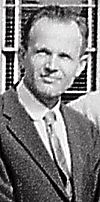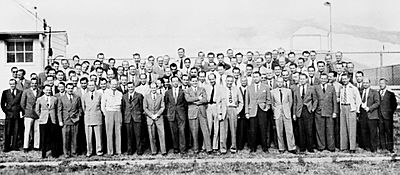Ernst Geissler facts for kids
Ernst Geissler was a talented German-American aerospace engineer. He was born on August 3, 1915, in Chemnitz, Germany. Later in his life, he moved to the United States and passed away on June 3, 1989, in Huntsville, Alabama. Geissler played an important role in the early days of space exploration in the United States.
Contents
What is an Aerospace Engineer?
An aerospace engineer is a scientist who designs, builds, and tests aircraft and spacecraft. They work on everything from airplanes and helicopters to rockets and satellites. Ernst Geissler's work focused on rockets, which are powerful vehicles used to launch spacecraft into space.
Coming to America: Operation Paperclip
After World War II ended, Ernst Geissler came to the United States on November 16, 1945. He was part of a special program called Operation Paperclip. This program brought many German scientists and engineers to the U.S. to help with scientific research, especially in rocket technology. The goal was to use their knowledge to advance American science and technology.
Working at NASA
Ernst Geissler joined NASA, which stands for the National Aeronautics and Space Administration. NASA is the U.S. government agency responsible for space exploration and research. In 1960, Geissler became the director of the Aeroballistics Division at NASA's Marshall Space Flight Center.
What is Aeroballistics?
Aeroballistics is a field of study that looks at how rockets and other objects move through the air and space. It's all about understanding the forces that act on a rocket as it flies. This knowledge is super important for making sure rockets fly straight and reach their targets, like sending astronauts to the Moon or launching satellites into orbit.
Awards and Recognition
Ernst Geissler received several important awards for his contributions to space science.
- In 1973, he was given the NASA Certificate of Appreciation. This award recognized his hard work and dedication to NASA's missions.
- Also in 1973, he was awarded the NASA Distinguished Service Medal. This is one of NASA's highest honors, given to people who have made outstanding contributions to the agency's goals.
- He was also elected a Fellow of the American Astronautical Society. This means he was recognized as a leading expert in the field of astronautics, which is the science and art of spaceflight.
Ernst Geissler's work helped lay the groundwork for many of the space achievements we see today. His efforts were crucial in developing the rockets that launched America's space program.
 | William Lucy |
 | Charles Hayes |
 | Cleveland Robinson |



